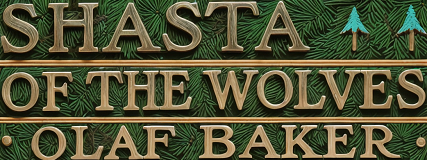 |  |
Wild at Heart Homepage | Contents | Previous Chapter
CHAPTER V
GOMPOSH, THE WISE ONE
The moons went by and the moons went by. The slow moons slipped into each other and were tied into bundles, a summer and a winter to each bundle, and so made up the years.
Shasta did not know anything about that measuring of time, nor that people talked of growing older out there in the world. All he knew was that there were day and night, and that the great lights came and went in the heavens, stepping very slowly upon gold and silver feet. But he knew when the loon, the great northern diver, cried forlornly in the night, that the long cold was at hand, and that he would have to stay in the cave to keep himself from freezing to death. And then it was that Nitka and Shoomoo exerted all their arts to keep the man-cub alive; and when the small game grew scarce, and the caribou hunting began, many and many a chunk of venison the little Shasta devoured, and throve marvellously upon the uncooked meat. The meat made him warm, and kept the rich blood at full beat in his veins; and that he might be the warmer when he slept, he scooped a hole in the side of the cave, filling it with dry grass and leaves and a lining of fur and feathers torn from the outside of his meat. He learnt this nest-making from the homes of the wild creatures he discovered in his ramblings in the early spring and summer; for everything you learnt then seemed somehow to be in preparation for the grim time of the winter, when the blizzard howled from the north, and even the wolves, and the caribou they hunted, had to flee before the blast.
It was after many summers and winters had been tied together in bundles that one bright September morning Shasta left the cave and made for a tall rock, overlooking the gorge of the stream. When he reached it, he squatted down and watched what might happen below. No one saw him there--the little brown thing on the rock; and no one minded him, which was even more important, because he perched above the level of the run-ways, and of the creatures whose noses are always asking questions of the lower air.
But some one whom Shasta did not know, and who was wiser than all the other wise folk of the forest, was also out for a walk that wonderful autumn morning, and on soft and padded feet came softly down the mountain slopes above Shasta’s airy perch. And this was Gomposh, the old black bear.
Gomposh was very old and of a wonderful blackness. When he walked out in the sun the light upon his fur rippled in silver waves. As for his years, not even Goohooperay, the white owl, could tell you how many they were, much less Gomposh himself.
It was not any sound Gomposh made that told Shasta of his presence, but suddenly, with out any warning to his eyes, or ears, or nose, Shasta knew. And this was owing to that unexplained sixth sense which the wild animals possess, and which Shasta, after his long dwelling among them, shared to a remarkable degree. He turned round all of a sudden, and there, not fifty feet away, stood Gomposh the Old in all the wonder of his black, black fur.
For the first moment Shasta felt afraid. Here was another bear--smaller, indeed, than the grizzly, but none the less a bear! And now, if the black bear meant mischief, escape was impossible because the rock was too steep for any foothold on the outer face of it, and between its inner side and the open mountain stood the bear. Then, in some odd way which he did not understand, the fear passed, and he knew that this time he was in no danger at all, and that the newcomer with the black robe would do him no harm.
Gomposh waited for a while, observing Shasta with his little wise eyes and making notes of him inside his big wise head. Then, very deliberately and slowly, he came down the slope towards Shasta and sat down on his haunches before him on the rock. For a minute or two neither of them spoke, except in that secret language of eye and nose which makes unnecessary so much of the jabber that we humans call speech. But presently Shasta began to ask questions in wolf-language and Gomposh made answers in the same. And the sense of what they said was as follows, though the actual words were not our human words at all, but deeper and sweeter in the meaning of them, and much nearer to the truth.
“Shall we be brothers, you and I?” Shasta asked, a little timidly, for he was feeling shy.
Gomposh looked at him kindly out of his little pig-like eyes.
“We are brothers,” he said. “I am old Gomposh, brother to all the forest folk.”
“I am brother to the wolves,” Shasta replied.
“You will find yourself brother to many strange folk before you are much older,” Gomposh said, and when he had finished he gave a slow wag with his head.
“Who are the folk?” Shasta asked wonderingly.
“Ah!” Gomposh said, looking even wiser than before. He looked so tremendously full of knowledge that Shasta felt very small and ignorant indeed.
“There are the lynxes and the foxes to begin with,” Gomposh said after a pause. But Shasta shook his head.
“No,” he said. “They are not brothers. We have no kinship with them, we of the wolves.”
Gomposh looked at him for a minute or two without speaking, and Shasta felt uncomfortable.
“It is not for you to say who are not brothers,” Gomposh said gravely. “You are not a wolf!”
Shasta blinked his eyes at that. It was the first time any one had told him that he was not a wolf.
“But I am!” he said. “Nitka and Shoomoo and the brothers--we are all of the wolf blood. I have many brothers,” he added, as if to make the matter clearer. “They are all out in the world.”
“I am aware of that,” Gomposh said; “but many brothers do not make you different from what you are.”
Shasta could not think of an answer to that, so he was silent for a little time, while something which began to be a question grew big within his head.
“If I am not a wolf, what am I?” he asked at last.
“You will find that out later on,” Gomposh said with aggravating calmness. “At present it is enough for you to know what you are not.”
“But I don’t know it,” Shasta said bravely, because he was not going to give way weakly before a bear, if he were never so old, and never so wise. “How do you know that I am not a wolf?”
Gomposh blinked and did not answer for a moment or two. He was taken by surprise, and was just a little shocked. In all his long experience, reaching over many years, no one had ever questioned his wisdom before, nor asked him how he knew. The man-cub was very impudent. It would have been the easiest thing in the world, with one cuff of his big black paw, to teach the man-cub manners, and send him spinning from the rock. But although Gomposh had a great idea of his own importance, he had also a kind heart, and there was something in him which went out tenderly towards the little naked cub, impudent though he was. So he contented himself with being very stiff and stand-offish when he spoke again.
“I have eyes,” he said. “I have also a nose. You are not wolf to my eyes, and you are only half wolf to my nose.”
This was a knock-down blow to Shasta, and he didn’t know what to say.
“I am sorry if I don’t smell nice,” he said lamely after a while.
“I didn’t remark that you didn’t smell nice,” Gomposh said. “Smell is a thing for everybody to decide on for himself.”
“What is the smell in me that isn’t wolf?” Shasta asked.
“That you will know later,” Gomposh replied.
“But when?" Shasta asked. “Today, or tomorrow, or when the moon is full?”
“That I do not tell you,” Gomposh said. “When the time comes, you will know.”
And that was all Shasta could get out of him. Gomposh either couldn’t or wouldn’t say more, and when he had sat for a little while longer he got up and slowly walked away.
Shasta watched him disappear into the chaparral thicket to the left, and heard him for some time afterwards as he knocked the rotten logs to pieces in his search for grubs.
For a long, long while Shasta sat where he was and gazed down the gorge. An odd feeling that was almost unhappiness was in his head and his stomach, and the feeling went rolling over and over inside him and knocking itself against the corners of his brain. “Not a wolf! Not a wolf !” the feeling kept rapping out. Then, if he was not a wolf, what was he? he asked himself. His memory, groping backwards into the dim beginnings of his life, worked hard to uncover the secret of what he really was; but, try as he would, he could remember nothing but the den and the wolf life that had its centre there, and the happenings of the mountain and of the forest, and the ways of their folk.
There was nothing else--no shapes of tall beings that carried bows in their fore-paws and walked always on their hind legs--nothing that told him of his Indian birth.
The morning slipped into the afternoon, and still Shasta sat motionless, humped upon the rock. His eyes were down the gorge, or on the opposite ridge where the tops of the spruces were jagged against the sky. Down below him, on the old run-ways that had threaded the thickets since the beginning of the world, the creatures came and went. Shasta knew them each by sight. He had known them all his life. Yet now, as their familiar forms came noiselessly like shadows over the grass, he had a peculiar feeling of being separated from them by the new knowledge that, somehow, he was of another world. When the thin smell of the twilight came drifting through the trees, then, and not till then, Shasta slipped down noiselessly from his rock and stole homewards to the den.
But in the dark the odd feeling was still questioning: “If I am not a wolf, what am I?”